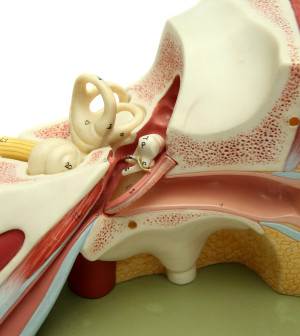- Could Your Grocery Store Meat Be Causing Recurring UTIs?
- Are You Making This Expensive Thermostat Error This Winter?
- Recognizing the Signs of Hypothyroidism
- 10 Strategies to Overcome Insomnia
- Could Artificial Sweeteners Be Aging the Brain Faster?
- Techniques for Soothing Your Nervous System
- Does the Water in Your House Smell Funny? Here’s Why
- Can a Daily Dose of Apple Cider Vinegar Actually Aid Weight Loss?
- 6 Health Beverages That Can Actually Spike Your Blood Sugar
- Treatment Options for Social Anxiety Disorder
FDA Approves Inhaled Diabetes Medication


People with type 1 or 2 diabetes now have a new means of getting their medication, with the U.S. Food and Drug Administration’s approval on Friday of the first inhaled medicine for the blood sugar disease.
The drug, Afrezza, “is a new treatment option for patients with diabetes requiring mealtime insulin,” Dr. Jean-Marc Guettier, director of the Division of Metabolism and Endocrinology Products in the FDA’s Center for Drug Evaluation and Research, said in an agency news release on Friday.
He said that Afrezza’s approval “broadens the options available for delivering mealtime insulin in the overall management of patients with diabetes who require it to control blood sugar levels.”
Diabetes falls into two main categories: type 1, an autoimmune illness which is often inherited and involves a dysfunction of insulin-producing cells in the pancreas; and type 2, which develops over time and is tied closely to obesity. Between 90 percent and 95 percent of diabetes cases are of the type 2 variety, according to the U.S. National Institutes of Health.
The FDA estimates that almost 26 million Americans — about 8.3 percent of the population — now live with diabetes, which can lead to dangerous complications such as heart disease, vision loss and nerve and kidney problems. Many patients must take injected insulin daily to maintain healthy blood sugar levels.
Afrezza’s approval came after a study involving more than 3,000 people — approximately 1,000 with type 1 diabetes and nearly 2,000 with the type 2 form of the illness.
For people with type 1 disease, researchers compared the effectiveness of Afrezza in adult patients against that of fast-acting insulin (aspart), used in both cases alongside basal insulin (long-acting insulin). Over 6 months, the combo of long-acting insulin and Afrezza met required treatment effectiveness in terms of blood sugar control, the FDA said.
For patients with type 2 diabetes, researchers combined Afrezza with standard diabetes pills and compared the use of the inhaled drug at mealtimes against the use of standard medications plus a placebo. At six months, the Afrezza-plus-standard medications combination produced better results overall, the FDA said.
The agency stressed that Afrezza should never substitute for long-acting insulin, and patients with type 1 diabetes must use the drug in combination with long-acting insulin. Smokers should avoid Afrezza, as well, the agency said, and the drug is not to be used in the treatment of a condition called diabetic ketoacidosis.
People with certain lung conditions should also not use Afrezza, due to a dangerous complication called acute bronchospasm. For this reason, the FDA has ordered a warning be placed on the product’s labeling to caution people with chronic obstructive pulmonary disease (COPD) from using the drug. The FDA is also advising that people with asthma avoid Afrezza for the same reason.
According to the agency, the most common side effects from Afrezza were hypoglycemia (low blood sugar), cough, and throat pain or irritation.
The FDA is also ordering that “post-marketing studies” be conducted to track the safety and effectiveness of Afrezza in children, and to see if there is any connection between the use of Afrezza and any lung cancers.
Afrezza is manufactured by MannKind Corporation of Danbury, Conn.
More information
For more on type 1 and type 2 diabetes, head to the American Diabetes Association.
Source: HealthDay
Copyright © 2026 HealthDay. All rights reserved.










